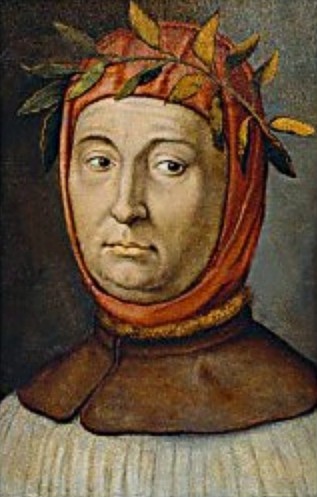In what is considered by many academic circles as the origin
of the modern Humanist movement, Francesco Petrarca led a group of peasants to
the summit of Mount Ventoux in Provence, France. He was inspired by an old
timer who said that he had climbed the mountain in his youth fifty years
before. Petrarch, reminded of the great achievements of the ancients,
determined to revisit such a humble glory and reawaken a spirit of the people
to act. He rallied locals into joining him even over the warning of the old
timer and instilled in them a sense of accomplishment rarely felt by
subsistence farmer peasants. In later letters, he often recounted being asked,
“Why do you do this?” He responded, “Because we can.”
Petrarch, just thirty-two at the time of his ascent, was
born in Arezzo, Italy. His father, SerPetracco, was a clerk in the growing
Florentine middle class and friends with poet Dante Alighieri. When the city’s
politics turned away from their “White Guelphs” faction, SerPetracco left the
city to join the papal staff in its move to Avignon. There SerPetracco ensured that
his sons Francesco and Gherardo followed his footsteps. Young Petrarch was
reluctant in his studies and yearned to dedicate his time to reading the great
literature of the ancient Romans, especially the devout St. Augustine of Hippo.
Nevertheless, as a dedicated Catholic, he obeyed his father’s wishes.
A pivotal moment in Petrarch’s life came after his father’s
death in 1326. A legal battle broke out over the inheritance back in Florence,
and his guardians attempted to manipulate the court to snatch up property that
was rightfully Petrarch’s. Rather than hold to idealism, Petrarch dedicated
himself to the battle and eventually won through his passionate appeals and
strict foundation of reason. Following the victory, Petrarch found work as a
clerk himself in the papal offices, often traveling as an ambassador and using
his free time to write his many letters.
In the same years that Petrarch completed his studies,
1323-1324, the Church had its own issues with property. The growing power of
the Franciscans had revitalized the idea of the “Poverty of Christ and the
Apostles,” which, extrapolated to that time, brought many to believe that the
Church should not own anything. Through papal bulls that split the Franciscans
and eliminated its rogue factions, the Church defended its right and responsibility
to hold property, even though Christ himself spoke, “Foxes have holes, and
birds of the air have nests, but the Son of Man has nowhere to lay his head.”
Petrarch agreed with this temporal nature of the Church (perhaps since his own
job depended upon it), but it led to another problem: wealth-seeking through indulgences.
For centuries in the Church, the concept of an “indulgence”
had existed as a recorded way to make penance for sins. Many of the actions of
penance included prayers, fasting, pilgrimages, or paying alms. Gradually, the
paying of alms turned into a system of fines, which became a way not only for
the wealthy to write a simple check to get away with moral crimes, but also for
corrupt members of the Church to draw money from congregations nervous about
their afterlives in Purgatory. With enormous amounts of money changing hands, counterfeiting
and con-men posing as traveling priests offering absolution were widespread.
Disappointed in the weighty hierarchy of his work and in the
human populace as a whole, both those selling fraudulent indulgences and those
duped by them, Petrarch continued dreaming of the ancients and their glorious
deeds. The failure of the Crusades and the lack of literary work brought him to
consider the past millennium a “dark age,” and he aimed to bring a new light.
Upon his march up Mt.Ventoux, he paused to read from St. Augustine’s Confessions, “…Men go about to wonder at
the heights of the mountains, and the mighty waves of the sea, and the wide
sweep of rivers, and the circuit of the ocean, and the revolution of the stars,
but themselves they consider not.” Then he dismissed the peasants, encouraging
them to learn to read and go to confession seeking real penance rather than
paying indulgences.
Petrarch continued to write. Through his letters, he became
famous in Italy and France, earning patronages that he used to encourage
universities and education, particularly of Latin literature to inspire the
people to work toward great deeds that would benefit their own name.
Considering oneself as well as the Church, made Petrarch a controversial
figure. Nevertheless, with his legal work promoting Church interest in
maintaining its property, he earned a position within the inner echelons and
extensively furthered St. Augustine’s writings as well as mundane ethical
discussions from writers like Cicero.
In 1392, eighteen years after Petrarch’s death, Boniface
IXended the tradition of indulgences for the afterlife, returning to the old
standard of making them only for temporal penance, a policy which Petrarch had
championed his many days. While that may have emptied some church coffers, many
applauded it as an action of reform that strengthened the Church and its
significance in human morality even as the world around it came to new
strengths of science and technology.
--
In reality, Petrarch lost his court case in his youth along
with his inherited property, which forever gave him a foul taste for law.
During his day job with the Church, he wrote extensively and gained fame with
his epic poem Africa about the Roman
general Scorpio’s invasion in the Punic Wars. Its prominence caused him to be
the first poet laureate in Europe in one thousand years. He climbed Mt. Ventoux
out of aesthetic value, which is sometimes considered the first action of the
Renaissance and birth of Humanism.

No comments:
Post a Comment